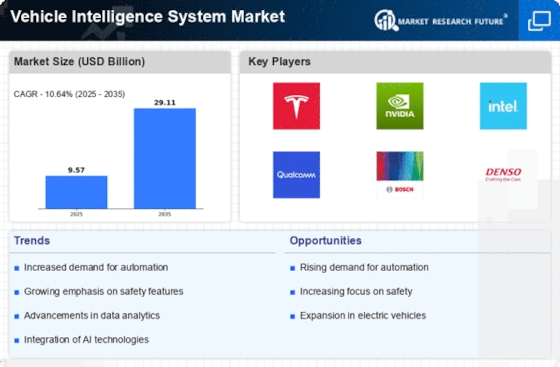Top Industry Leaders in the Vehicle Intelligence System Market
*Disclaimer: List of key companies in no particular order
Top listed global companies in the Vehicle Intelligence System industry:
Denso Corporation (Japan)
Delphi Automotive PLC (U.K.)
Autoliv Inc. (Sweden)
Magna International Inc. (Canada)
Robert Bosch GmbH (Germany)
Mobileye NV (Israel)
Infineon Technologies AG (Germany)
Continental AG (Germany)
Wabco Holdings Inc. (Belgium)
Valeo S.A. (France)
Bridging the Gap by Exploring the Competitive Landscape of the Vehicle Intelligence System Top Players
The vehicle intelligence system market is a dynamic and rapidly evolving space, poised for exponential growth driven by factors like increasing demand for autonomous driving, advanced safety features, and connected car technologies. Understanding the competitive landscape within this complex market is crucial for stakeholders to strategically position themselves and capitalize on emerging opportunities.
Key Players and Strategies:
Established Tier-1 Suppliers: Traditional automotive giants like Bosch, Continental, and Denso hold a significant market share through their legacy in sensor technology, control systems, and established relationships with automakers. These players focus on expanding their product portfolios, integrating AI and advanced software capabilities, and forging strategic partnerships to stay ahead of the curve.
Tech Giants and Startups: Tech giants like Google, Baidu, and Apple are making inroads with their expertise in AI, software development, and cloud computing. Startups like Tesla and Mobileye are also disrupting the market with innovative approaches to autonomous driving and driver-assistance systems. These players leverage their agility and focus on specific technology niches to gain footholds and challenge established players.
Chipmakers and Semiconductor Companies: Companies like Infineon, Qualcomm, and Nvidia are playing a crucial role in developing the hardware backbone of vehicle intelligence systems, specifically in areas like high-performance processors, graphics processing units, and specialized AI chips. Their strategies revolve around constant innovation, partnerships with key players, and expanding into adjacent markets like ADAS and V2X communication.
Market Share Analysis Factors:
Technology Portfolio and Innovation: Companies with diverse offerings encompassing sensors, software, AI algorithms, and connectivity solutions hold an edge. Continuous R&D and investment in cutting-edge technologies like LiDAR, radar, and advanced vision systems are crucial for differentiation and securing market share.
Partnerships and Collaborations: Strategic partnerships with automakers, tech companies, and research institutions allow players to access new markets, share expertise, and accelerate development. Strong collaboration ecosystems are becoming increasingly critical for success in this complex market.
Geographical Footprint and Regional Focus: The market dynamics vary significantly across regions. Adapting product offerings and strategies to address the specific needs and regulations of different markets is key to capturing regional market share.
Cost Efficiency and Scalability: As vehicle intelligence systems become more sophisticated, cost optimization and scalability remain crucial for wider adoption. Players with efficient manufacturing processes and economies of scale will be better positioned to compete.
Emerging Trends and Company Initiatives:
Personalization and Customization: Companies are focusing on personalizing driving experiences through AI-powered features like adaptive cruise control, predictive maintenance, and in-vehicle entertainment systems tailored to individual preferences.
Cybersecurity and Data Privacy: As vehicles become more connected and generate vast amounts of data, robust cybersecurity measures and data privacy protocols are becoming critical differentiators. Companies are investing heavily in developing secure systems and addressing consumer concerns around data usage.
Focus on Sustainability and Environment: Integrating green technologies like energy-efficient driving systems and electrification solutions into vehicle intelligence platforms is gaining traction. Companies are responding to growing consumer and regulatory pressure to develop sustainable mobility solutions.
Overall Competitive Scenario:
The competitive landscape of the vehicle intelligence system market is characterized by intense competition, rapid technological advancements, and evolving customer demands. Players need to adopt agile strategies, embrace open innovation, and prioritize collaboration to navigate this dynamic ecosystem. Success will hinge on continuous innovation, strategic partnerships, regional customization, and a focus on providing personalized, secure, and sustainable driving experiences.
Latest Company Updates:
Denso Corporation (Japan):
- Oct 2023: Announced partnership with Microsoft to develop AI-powered in-vehicle experiences using Azure cloud services. (Source: Denso press release)
Autoliv Inc. (Sweden):
- Sept 2023: Completed acquisition of Veoneer, a competitor in automotive safety systems, to expand product portfolio and expertise. (Source: Autoliv press release)
Robert Bosch GmbH (Germany):
- Dec 2023: Launched AI-powered parking assistance system that can automatically park a car in various situations. (Source: Bosch press release)
Mobileye NV (Israel):
- Oct 2023: Achieved Level 4 autonomous driving capability in pilot program on highways in Arizona. (Source: Forbes)
Infineon Technologies AG (Germany):
- Sept 2023: Developed new radar sensors for autonomous driving with improved object detection and tracking capabilities. (Source: Infineon press release)










